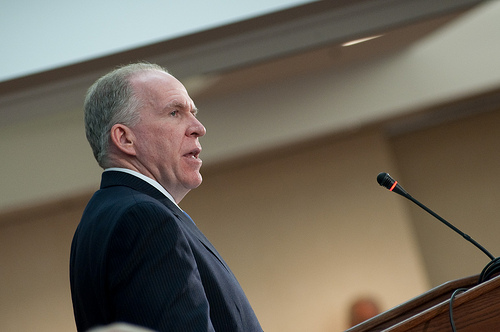Cyber wrap
The CIA is set to undertake one of its largest-ever internal restructures since its inception in 1947. The reorganisation will see a new ‘Directorate of Digital Innovation’ join the agency’s four existing directorates. CIA head John Brennan explained in a public memo:
Digital technology holds great promise for mission excellence, while posing serious threats to the security of our operations and information, as well as to U.S. interests more broadly…We must place our activities and operations in the digital domain at the very centre of all our mission endeavours.
The new directorate will play in the space between NSA’s traditional SIGINT role and Cyber Command’s warfighting remit. Jim Lewis elaborated, ‘If you think of NSA as a vacuum cleaner and Cyber Command as a hammer, this is a little more precise, and it’s about supporting human operations’.
The US Department of Justice has released details of the criminal indictment it’s launching against those behind one of the largest reported data breaches in US history. Two Vietnamese and one Canadian have been changed in connection with the crime that saw the email addresses of over one billion people stolen from several email service providers.
Sticking with the crime fighting theme, Britain’s National Crime Agency brings word that they’ve arrested one of the hackers suspected to have been behind a breach at the US Defense Department last year. The attack, which targeted Defense’s international satellite message dissemination system, resulted in the theft of the contact details of over 800 of the department’s staff.
In Beijing, the Chinese government has announced plans to support its growing e-commerce industry. Premier Li Keqiang told the opening of China’s annual parliamentary meeting that the government would actively help guide e-commerce and encourage international expansion of China-based technology companies. Li also laid out China’s ‘Internet Plus’ strategy which ‘includes promoting cloud computing, online banking, mobile internet, along with logistics to help e-commerce expansion.’
But Pony Ma, the head of one of China’s largest internet companies, thinks more should be done, calling for the government to strengthen China’s notoriously lax intellectual property laws. The Tencent CEO has argued that even in the rare cases where copyright infringers are apprehended, the penalties are weak and do little to dissuade further crime. But some have been quick to point out the irony in the comments given Tencent itself has been accused of copying other successful products in the past. (It was successfully taken to court by AOL-owned ICQ for copyright infringement in 1998.)
IHS Jane’s Intelligence Weekly has cautioned that North Korea is ‘highly likely’ to launch a barrage of online attacks against the South over the coming weeks in protest against joint exercises between the militaries of South Korea and the US. Cyberspace has played host to inter-Korean political disputes in the past, with both countries keen to avoid kinetic conflict.
The Malaysian Deputy Minister of Science, Technology and Innovation, Dr Abu Bakar Mohamad Diah, has announced that the government is set to review its national cyber security policy. The process, to be led by Cybersecurity Malaysia and the National Security Council, will be completed in the next two years. Over the next five years the government plans to ‘strengthen the country’s existing defences against cyber attacks including safer access to online information, use of e-forensics, integrity systems, strengthening trust between users and providers, and creating high availability systems.’ Malaysia also plans to increase its already substantial international engagement on cyber issues.
Jessica Woodall is an analyst in ASPI’s International Cyber Policy Centre. Image courtesy of Flickr user CSIS | Center for Strategic & International Studies.
